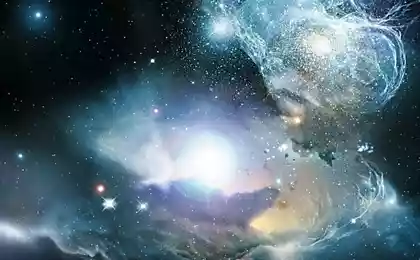729
Mind and matter.

In the XVII century Rene Descartes based his view of nature on a fundamental distinction between the two independent and separate spheres - the sphere of the mind, "thinking thing» (res cogitans), and the sphere of matter, "extended things» (res extensa). This conceptual gap between mind and matter more than three hundred years has been a commonplace of Western science and philosophy.
Following Descartes, scientists and philosophers have continued to consider the mind of some incomprehensible essence and could not imagine how this "thinking thing" refers to the body. Although neuroscientists already in the XIX century were aware of the close connection of brain structures with the thinking function, the actual ratio of the mind and the brain remained a mystery.
More recently, in 1994, the editors of the anthology, entitled "Consciousness in philosophy and cognitive neuroscience" frankly admitted in the foreword: "Although no one doubts that the mind is somehow connected with the brain, about the specific nature of this Communication is no consensus so far ».
The decisive progress made in this regard due to the systemic vision of life consisted in the rejection of Cartesian views the mind as a thing, and understanding that mind and consciousness are not things, and processes.
In biology, this new concept of intelligence has been developed in the 60s by Gregory Bateson, to use the term "mental process", and independently by Humberto Maturana, whose research interests focus primarily on cognitive, t. E. The process of cognition. In the 1970s, Maturana and Francisco Varela developed the initial construction of a full-fledged theory of Maturana, was known as the Santiago theory of cognition. Over the past twenty-five years studying the human mind under such a system point of view has given rise to diverse interdisciplinary field, called cognitive science. This new science was able to go beyond the traditional boundaries of biology, psychology and epistemology.
The conceptual breakthrough Santiago theory be the most obvious, if we go back to the thorny question of the connection between mind and body. In the Santiago theory, this connection is simple and unambiguous. The Cartesian view of the mind as a "thinking thing" is rejected. Mind is not a thing but a process - a process of knowledge, identified with the process of life. The brain - a specific structure through which this process occurs.
Modern scholars, as always, once again invented the bicycle, because in ancient times was considered a rational human mind is only one aspect of an immaterial soul or spirit. The main distinction is not between body and mind, and between body and soul, or body and spirit. In the ancient language of the concept of the soul and the spirit transmitted by breathing life metaphors. Word for "soul" in Sanskrit (atman), Greek (psyche) and Latin (animd) languages mean "breath." The same is true for the word meaning "spirit»: spiritus in Latin, Greek pneuma and ruah in Hebrew. All of them also means "breath." Behind all these ancient times it is that the general idea that the soul or the Spirit is the breath of life, ie, the basis.
The same is said in the Vedas that have been recorded (not painted!) Another 5 000 years, which puts them in a rank of the most ancient scriptures of mankind. So it is clearly stated that matter - is a dead substance which does not have the mind and life, and that the soul is a living being, which suits the material body for action in this world, just as you and I wear a suit going to work, sports uniforms, when we go to the gym, to festivals and holidays we dress for - And the third ... or anyone in the head does not come to call these costumes alive, moreover, say that the suit is the real 'I'. And the source of all activities in this world - it is the desire of the soul, which has intelligence and is temporarily stored in a material body, controlling which makes it easy to work.
Thus, logically, understand that "I" is not a temporary body, I have a soul, which is in this body. Then everything falls into place and everything is clear. Why do I, or rather, not really me, and my body, sometimes you want something "such things" that I (really) disgusting and not nice. Why do I feel the same, despite the years flown that significantly changed my physical body. Why is the most terrible and profound suffering - this is not the physical pain - the pain caused to my body, and mental and moral - the pain caused by the present me ... And a lot of why just becomes easily understandable.
But most importantly the "why" for the curious pochemuchek - how to see yourself this and who the source (cause) of the existence of my true (mom and dad, which we accept as such, just gave me a temporary material body, but who present my father and my mother, who I He gave a true life (spiritual body), rather than the temporary material "suit")?
As the structure of the universe is connected with the structure of the human?
Every earthly man carries a double karma.
























